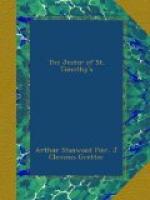Mr. Upton, the younger brother of the boys’ father, who had been the village clergyman, shared his brother’s tastes; he read good books, he would travel to hear a celebrated man speak, he had ideas which were not bounded by his farm. He had encouraged Irving as well as Lawrence to seek a university education. The two boys were proud, eager to free themselves from dependence on the uncle and aunt who, after their father’s death, had given them a home. Irving had worked his way through college, hardly ever asking for help; he had been a capable scholar and the faculty had found for him backward students in need of tutoring.
Meanwhile, Mr. Upton had been busily engaged in developing and increasing his farm; that he was beginning to be prosperous Irving was aware; that he did not more earnestly insist upon helping his nephews stimulated their spirit of independence. They knew that they had been left penniless; Irving sometimes suspected his uncle of parsimony, yet this was a trait so incongruous with Mr. Upton’s genial nature that Irving never communicated the suspicion to his brother. Irving felt, too, that his uncle cared less for him than for Lawrence. Well, that was natural; Irving was humble there.
When the dean of the college had said that it would be inadvisable for Lawrence to make a start unless he had at least three hundred dollars at command, it had seemed to Irving a little narrow on his uncle’s part not to have come forward at once with that sum. Instead he had merely given Lawrence the opportunity to work harder in the hay-field and so increase his small bank account. And it had soon become apparent to Irving that unless he and Lawrence could between them raise the money, they need not look to their uncle for help beyond that which he was already giving. Therefore Irving went into Mr. Beasley’s store, and hoped daily for the letter which at last had come.
Day after day the two brothers worked together. Irving, quick, impatient, sometimes losing his temper; Lawrence, slow, calm, turning the edge of the teacher’s sarcasm sometimes with a laugh, sometimes with a quiet appeal. Irving always felt ashamed after these outbreaks and uneasily conscious that Lawrence conducted himself with greater dignity. And Lawrence forgot Irving’s irritations in gratitude to him for his help. “It must be a trial to teach such a numskull,” Lawrence thought; and at the end of one particularly hard day he undertook to console his brother by saying, “Never mind, Irv; it won’t be long now before you have pupils who aren’t country bumpkins and don’t need to have things pounded into their heads with an axe.”
It had been a rather savage remark that had called this out; Irving threw down his book and perching on the arm of his brother’s chair, put his arm around his neck and begged his forgiveness.
“As if I could ever like to teach anybody else as much as I like to teach you!” he exclaimed. “I’m sorry, Lawrence; I’ll try to keep a little better grip on myself.”




